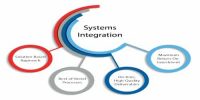An information system can be defined as a set of the coordinated network of components, which act together towards producing, distributing and or processing information. A computer-based information system is an information system in which the data is mostly collected, stored, and processed in digital format using computerized processes.
Major benefits of computer-based information: Possible benefits of a computer-based information system, with an example. These are as follows –
(A) Tangible benefit: Tangible benefits include –
- Increase in sales or profits; For example, Development of computer-based products and services.
- Decrease in information processing costs; For example, the elimination of unnecessary procedures and document.
- The decrease in operating cost; For example, a reduction in inventory carrying a cost.
- Decrease in required investment; For example, Decrease in inventory investment required.
- Increase operational ability and efficiency; For example, Improvement in production ability and efficiency.
(B) Intangible benefits:
- New or improved information availability; For example, More timely and accurate information and new types of information.
- Improved abilities in computation and analysis; For example, analytical modeling.
- Improve customer service; For example, a more timely service response.
- Improve employee morale; For example, Elimination of burdensome boring job tasks.
- Improved management decision making; For example, better information and decision analysis.
- Improve competitive position; For example, System which lock in customers and supplier.
- Improve business and community image; For example, Progressive image as perceived by customers, suppliers, and investors.















